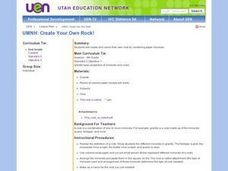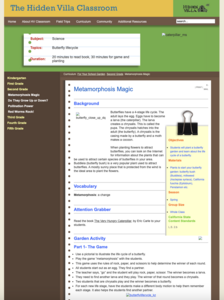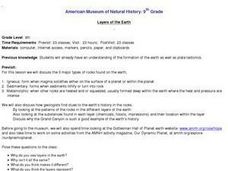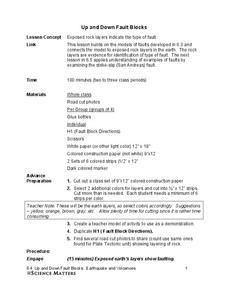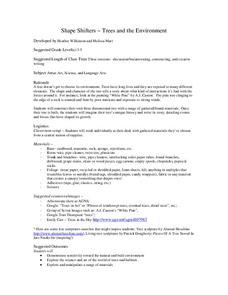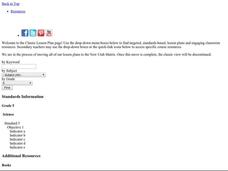Curated OER
Rock Concert
Students examine the three major types of rocks. They create a song, skit, or poem describing the three kinds of rocks and how they are formed, then present their creations for a class rock concert.
Curated OER
Name That Tune
Students complete a fingerprint oil lab in order to simulate how geologists use the oil and natural gas in rocks to hear sound waves that signify there are oil in those rocks. In this rocks lesson plan, students learn that the rock...
Curated OER
Create Your Own Rock!
Fourth graders create and name their own rock by combining paper minerals. They define rock and mineral, examine samples of minerals, and using colored scrap paper, arrange and glue the pieces of paper to represent a new mineral.
Curated OER
Metamorphosis Magic
Young scholars play rock-paper-scissors and create a play to demonstrate the butterfly life cycle. In this butterfly life cycle lesson plan, students also plant a butterfly garden with plants that attract butterflies.
Curated OER
Science: Create Your Own Rock
Second graders create rocks using colored paper to represent the various minerals. After reviewing the various minerals contained in rock, they cut pieces of scrap paper and paste them on handouts. Finally, 2nd graders give their rocks...
Curated OER
On the Seashore
Young scholars read the book On the Seashore and complete activities such as reading a book, color and cut out animal cards, model rock making, shell graphing, shell patterns, and more. In this seashell lesson plan, students use the...
Curated OER
Rock, Paper, Scissors
Students explore the concept of dominant and recessive genes by examining the dominant and recessive characteristics of a game of rock, paper, scissors. In small groups students play the game and explain how one move is dominant over...
Science Matters
Up and Down Fault Blocks
The Sierra Mountains in Nevada and the Tetons in Wyoming originally formed as fault block mountains. In order to visualize these fault blocks, pupils use construction paper to create layers of earth. They cut the paper models and form...
Scholastic
Lesson Four: The Earth, Layers of Earth
Get your hands dirty with a set of earth science activities! Class members delve into a hard-boiled egg to find the similarities to the earth's layers, create a papier-mâché model of the earth, craft a simulation of the earth's...
Science Matters
A Model of Plate Faults
The San Andreas fault is one of the longest fault zones in the world. In a series of 20 lessons, the fourth lesson has pupils use a paper model to recreate various types of plate faults. Each is held in position then drawn...
Curated OER
Rock, Paper, Scissors - Dominant and Recessive Traits from Parent to Offspring
Fifth graders understand the meaning of dominant and recessive. In this dominant and recessive traits lesson, 5th graders participate in a game and record results on a chart. Students relate experiment to genes. Students describe plants...
Curated OER
Map your Schoolyard
Students practice their mapping skills by creating an accurate map of their schoolyard using an aerial photo from the National Map web site. Students include legends, a scale, and a north arrow on their maps.
Curated OER
Survival Under a Rock
Students investigate ways that animals adapt to their environments through hands-on activities using isopods and an interactive video.
Curated OER
Rockin' and Rollin'
Seventh graders, in groups, describe the three major types of rocks through either a song, skit, poem, etc. They present their work to the class during a "rock concert."
Curated OER
How Can I Hide In Namib?
Students examine how various species survive in the Namib Desert. They watch and discuss a PBS video, and in small groups determine which colors are most effective in concealment in rocks, sticks, and sand, and compare the activity with...
Curated OER
Shape Shifters- Trees and the Environment
Students make a tree sculpture. In this trees and the environment lesson plan, students learn about the parts of a tree, discuss what a tree needs in order to grow, find images of trees in art and nature, use various materials to create...
Curated OER
Reflecting on Reflectivity
Students plan and construct a "mini-lab" to measure the reflectivity of different earth surfaces. They measure reflectivity of materials, including ice, soil, rocks, etc., and then extrapolate from what they have learned to consider the...
Curated OER
Plate Tectonics
Students participate in a series of experiments to learn about plate tectonics and the different materials of the Earth. In this plate tectonics lesson plan, students use eggs, water, beakers, paper, and more materials to learn about the...
Curated OER
Layers Of The Earth
Students examine the layers of the earth and the basic composition and thickness of each. Using construction paper, each student models the layers of the earth.
Curated OER
Rock, Paper, Scissors
Fifth graders explore genetic traits. In this genetic traits activity, 5th graders investigate dominant and recessive traits. Students identify similar traits between a parent organism and its offspring.
Curated OER
Mineral or Maceral Mosaic
Students study about geologists and their job. They also study that rocks are made up of minerals and organic material by conducting an experiment where they create their own "granite" or "coal".
Curated OER
Do You See What I See?
Second graders view a teacher-created terrarium, and complete a KWL chart. They discuss what they can see, Students go on a nature walk and compare the schoolyard to the terrarium, discussing the roles of rocks, plants, soil, and water...
Curated OER
Law of Superposition
Students identify the law of superposition and it states that beds of rock in a series are laid down with the oldest at the bottom and younger layers on the top. They construct a legen for a block diagram and construct a block diagram...




